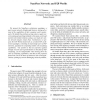Free Online Productivity Tools
i2Speak
i2Symbol
i2OCR
iTex2Img
iWeb2Print
iWeb2Shot
i2Type
iPdf2Split
iPdf2Merge
i2Bopomofo
i2Arabic
i2Style
i2Image
i2PDF
iLatex2Rtf
Sci2ools
139
click to vote
P2P
2003
IEEE
2003
IEEE
NanoPeer Networks and P2P Worlds
We present the NanoPeers architecture paradigm, a peer-to-peer network of lightweight devices, lacking all or most of the capabilities of their computer-world counterparts. We identify the problems arising when we apply current routing and searching methods to this nano-world, and present some initial solutions, using a case study of a sensor network instance; Smart Dust. Furthermore, we propose the P2P Worlds framework as a hybrid P2P architecture paradigm, consisting of cooperating layers of P2P networks, populated by computing entities with escalating capabilities. Our position is that (i) experience gained through research and experimentation in the field of P2P computing, can be indispensable when moving down the stair of computing capabilities, and that (ii) the proposed framework can be the basis of numerous real-world applications, opening up several challenging research problems.
Architecture Paradigm | P2P 2003 | P2P Architecture Paradigm | P2P Worlds Framework | Peer-to-Peer Computing |
Related Content
| Added | 05 Jul 2010 |
| Updated | 05 Jul 2010 |
| Type | Conference |
| Year | 2003 |
| Where | P2P |
| Authors | Peter Triantafillou, Nikos Ntarmos, Sotiris E. Nikoletseas, Paul G. Spirakis |
Comments (0)

